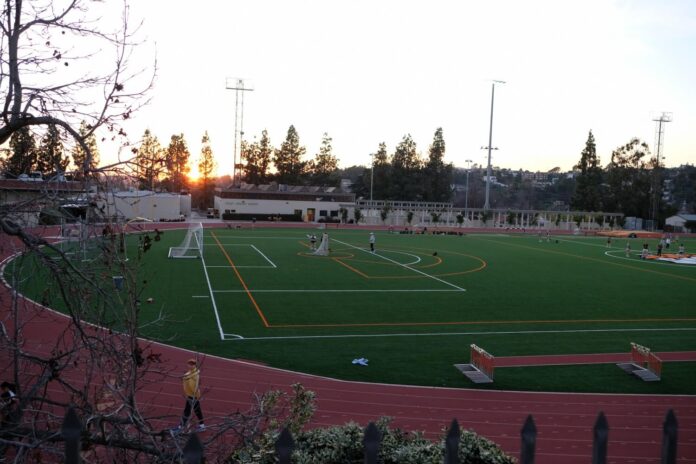
After Oxy Sexual Assault Coalition (OSAC) organized a “We Demand More” march Nov. 17, 2021 calling for accountability for sexual assault on campus, and sharing a formal list of demands to the college, sports teams have both continued some older practices and implemented newer policies regarding sexual assault prevention. The march and sports team’s new policies came in response to an update from the college’s Title IX office, which reported 29 cases of sexual misconduct between Aug. 1, 2021, and Sept. 27, 2021 — a number that was three times larger than what it was during the comparable period in 2019.
In OSAC’s list of demands, one section addressed student-athletes, asking that students reported to Title IX be suspended from team activities, with their team also participating in a sexual violence prevention course. OSAC calls for team-wide consequences if there is no improvement, according to the document of demands. In a Nov. 16 email, President Harry J. Elam said the college has plans to develop “continuing and targeted education if there are multiple reports of sexual misconduct by members of a specific athletic team.”
The NCAA requires all athletes and coaches to complete sexual violence prevention education each year. According to Project SAFE Program Assistant Junko Anderson ’21, Project SAFE gives standardized training to sports teams every year in which they educate the teams about the school’s resources and define forms of violence and sexual misconduct.
“We also offer information and communication strategies around consent, navigating relationships, and how to be an Upstander (Active Bystander) and how to support survivors of violence with the Empowerment Model, which can really be applied to any type of interpersonal support,” Anderson said via email.
Antonio Andrade (senior), one of the captains of the men’s baseball team, said OSAC’s march led his team to have a meeting about the expectations of the members.
“We knew that we needed to do a better job of not avoiding the conversation. For the first time in five years, we actually had a large team meeting with no coaches and addressed it as a team, and set standards,” Andrade said.
According to Luke Wetmore, head men’s baseball coach, the baseball team had a Project SAFE training earlier this semester. They, along with other sports teams, also have Justice, Equity, Diversity and Inclusion (JEDI) programming.
“[JEDI training is] not necessarily geared towards sexual violence awareness, but it is very in line with that type of conversation. I would not be surprised if this topic comes up going forward,” Wetmore said.
Preston Chong (senior), another captain for the men’s baseball team, said the team tries to carry their values not only while playing, but in everyday life as well.
“I think the OSAC march shed a lot of light on the issues going on in the Oxy community. As a team, we confronted it head-on with internal team meetings in the fall,” Chong said. “We try to hold each other accountable, whether it be on the baseball field, or any other aspect of social settings or life.”
Although club sports like Frisbee are not bound by the same NCAA rules that Division III sports are, the Frisbee team still participated in Project SAFE training, according to captain Cole Lewis (junior). Project SAFE Program Manager & Survivor Advocate, Tirzah Blanche also confirmed that the Frisbee team underwent training in late February.
“It was a standard presentation they give to all teams. It consisted of ways sexual assault and abuse can present itself and how to spot it and what we can do as a team and a team culture to combat it,” Lewis said.
According to Anderson, Project SAFE has revamped the coverage of their trainings this spring.
“This Spring we added a segment on rejection resilience to our consent section so that we can talk about how to navigate an interaction respectfully when we do not give or receive consent,” Anderson said via email.
Henry Grady (senior), one of the captains of the men’s water polo team, said that they have been meeting with a consultant who works with teams to address issues with team culture. According to Grady, the consultant, Pam Herath, helps the team set goals for team culture.
“She [Herath] lays out a groundwork for us and essentially guides us on the path to forming these ideas that the team wants to implement into our culture,” Grady said.
The water polo team also has a written document of team standards to remind them of their priorities, which they keep in the front cover of their team binders, according to Grady.
According to Wetmore, the problem stems from male violence.
“If you look at the numbers, it is male violence against women,” Wetmore said. “I think it is really important, not just in athletics, but with male-identifying students and student athletes on campus, that we are working to be part of the solution. To create a community that is safe for all of its members.”
Wetmore also said that men on campus have a responsibility to support survivors of sexual violence.
“It is important that we are outspoken with our support of victims of sexual violence because it is coming from our demographic,” Wetmore said
Andrade said the baseball team has their standards set by upperclassmen and that they want members of their team to be upstanders in social situations. According to Anderson, part of the team’s training is geared towards helping set those types of standards and making a habit of upholding teammate accountability.
“In order to disrupt violence at any level, it’s important for people to disrupt violence at the most casual levels. It signals that further disrespect will not be accepted and gives people good practice for being active bystanders,” Anderson said via email. “It also builds a culture of accountability. Checking someone for their bad behaviors is a show of confidence that you know they want to be a good person and would want to be better, given the right tools.”
![]()






























